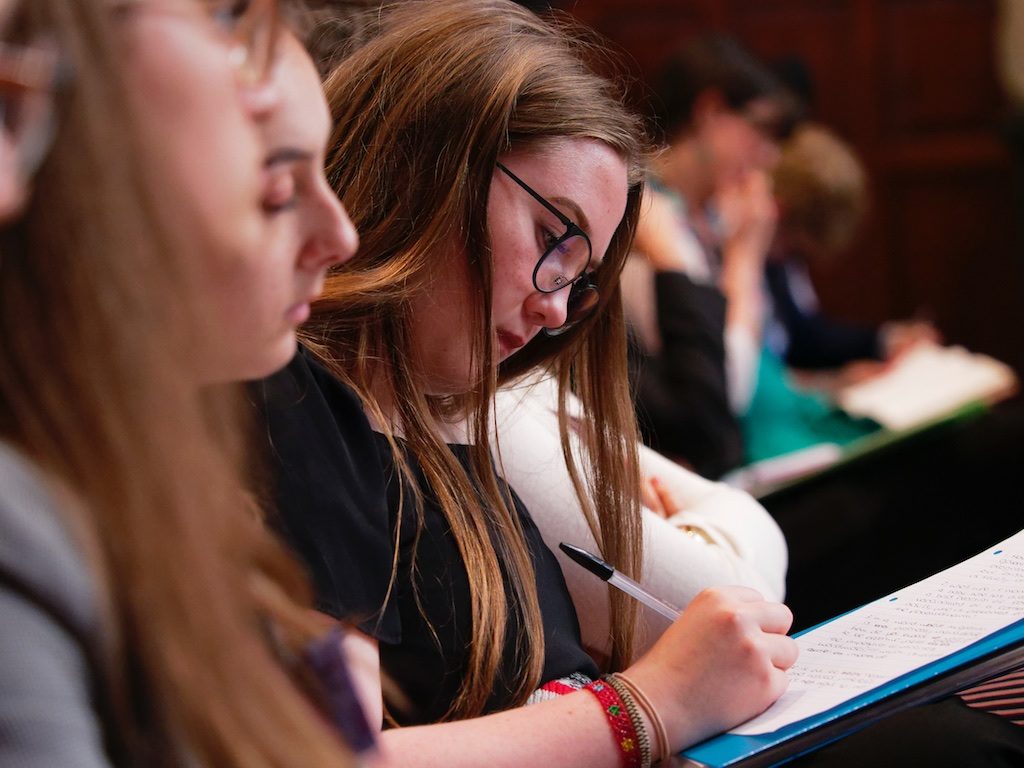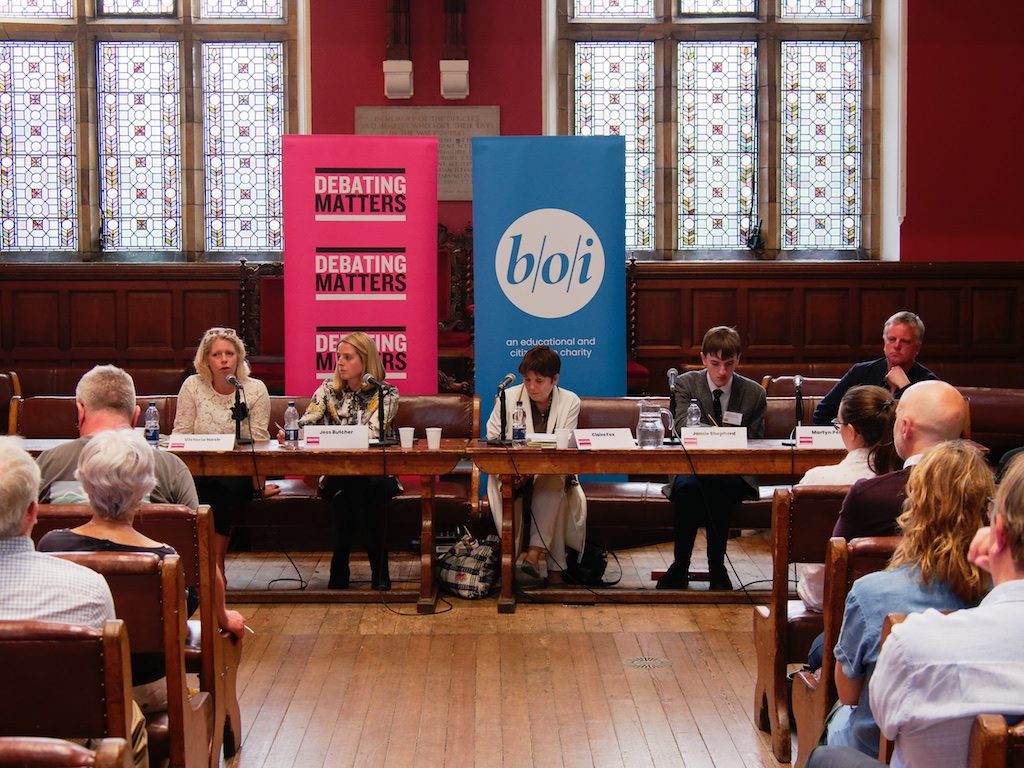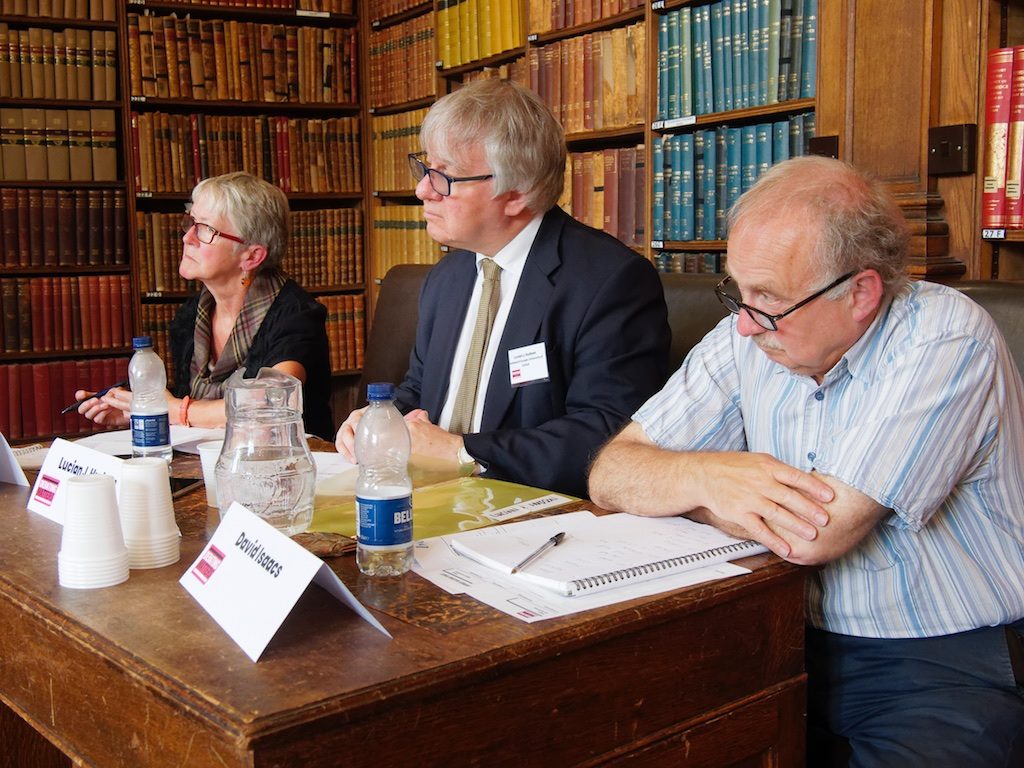Resource pack section 2D
Having got something in motion you should have a go at a formal debate, either within your own school or with another school. Below is a list of things you will need to do:
CHOOSE A TOPIC: Start the process off by choosing a topic and motion.
CHOOSE YOUR SPEAKERS: Choose two speakers FOR the motion and two speakers AGAINST the motion.
CHOOSE YOUR JUDGES FOR AN IN-SCHOOL DEBATE: Approach three teachers, governors or members of the senior management team to judge the debate, or other adults working within the school e.g. librarians, or older students. Make sure that you have a diverse group
OR CHOOSE YOUR JUDGES FOR AN INTER-SCHOOL DEBATE: because the panel must be impartial, you should consider inviting external judges to participate. Our advice would be to draw on existing contacts as much as possible; if you have an opinionated friend then invite them along! Also draw on the recommendations of friends and colleagues, even better if they can broker introductions. Otherwise Debating Matters can recommend contacts, or good organisations to contact.
CHOOSE A CHAIRPERSON: For whom, see overleaf. For good advice on chairing see here
PREPARATION
As with decorating a house,the quality of the final product is largely dependent on the quality of the preparation. This is particularly true of the Debating Matters format. Students need to be committed to the task. They need to be given a topic and sufficient time to research it properly. It will almost certainly be necessary,especially early on ,for you to provide resources that they can use. This is why Debating Matters produces its Topic Guides,to give students the depth of material that they will need.
Having done the research,speakers need to prepare opening speeches. These should then be road-tested with their teammates,with other students and the teacher asking them questions,making suggestions about improvements,etc. The first taste of formal debating is always nerve-racking, so you will need to be positive and supportive! But it is also important to be critical and to identify weaknesses in students’ arguments, so that they can improve and respond to challenges on their feet. It is through this process that speakers gradually gain confidence.

JUDGE COMMENT: ELISABETH TRIBE Managing Director, Hodder Education Schools Division, ” I come back to judge every year because I’m impressed by the dedication and preparation, but also by the rigour and liveliness of the event. It’s all enormously stimulating. Students prepare incredibly well for the debates and really care about them. When I ask them questions ,I’m impressed by how well they think on their feet,and are so focused and engaged.
THE QUALITIES OF……
A GOOD CHAIRMAN
The chair plays an important role in the Debating Matters format, acting as ringmaster of proceedings and putting everyone at ease. For good advice on chairing see the notes linked to here. To begin, you may want to chair debates yourself, but build up a core of trusted and effective chairpeople, particularly other staff. Students can make good chairpeople, but need experience before handling formal debates.

A GOOD JUDGE
The judges are central to the success of the Debating Matters format, whether they are teachers or adults within a school, or the leading scientists and public figures who volunteer. Their task is to take young people seriously by cross-examining their arguments, and pushing them to substantiate their case. Concentrating on one team at a time, each judge asks a question in turn and then follows up, seeking to make the speakers move the argument forward. The judges have fifteen minutes with the teams, approximately seven minutes with either side. The judges also need to keep notes about the performance of each team, because at the end of the debate they are asked to provide constructive feedback about what each team, and individuals within the team, have done well, and what could be improved. Finally, the judges are responsible for deciding which team has won the debate. For advice for judges see here. As you develop the use of the Debating Matters format, you will want to build up a reliable team of judges who understand the principles and can question speakers appropriately. Colleagues should be approached first; senior management and headteachers can add a sense of occasion. Once debating is firmly established, it is worth seeking external judges who can bring expertise from a range of backgrounds. School governors and parents, local businesses, doctors, solicitors, journalists are all worth approaching.
A GOOD DEBATER
In the eyes of Debating Matters, good debaters are made and not born! While some might have a propensity for debate, being thoughtful, intelligent, passionate about ideas and a strong team player, more often than not such qualities are developed through research, argument, encouragement, criticism and experience. However, one important trait to emphasise and develop for the Debating Matters format is intellectual bravery. It is always easier for speakers to take the middle ground, and offend no one. However, in our experience, a winning argument is one where students take up and defend an important principle, taking it to its logical conclusion where possible.
A GOOD AUDIENCE
The audience play an important role in Debating Matters debates, with ‘audience questions’ taking up a significant part of the discussion. Alongside the judges, audience members contribute to the discussion by asking speakers challenging questions and making points of their own. The atmosphere that we aspire to is one of a lively public meeting, not a question and answer session. Debaters are under no obligation to answer all questions put to them, rather this section of the debate is given over to the audience, with some comment from the panel. In the early days the audience is likely to consist of members of your debating group. As you organise more formal and public debates, you can invite other students and staff, perhaps parents and the local community, and encourage them to get involved – audiences rarely lack the willingness to put forward their own views! In the formal competition, Debating Matters award individual prizes which are open to all students present on the day and who contribute to the discussion, whether on a panel or from the audience. This not only recognizes outstanding individual contributions to the debates, but also helps to get the audience going!

ALL PUBLICITY IS GOOD PUBLICITY
Publicising your activities will motivate your debaters, and also spread the word and encourage others to become involved. Advertise events around school: recruit students to make and put up posters around the school, place notes in registers and make announcements in assemblies. Get students to write reviews and reports on your debates, take photographs, or make films. These can be posted on school intranet and internet websites. Teachers have also stressed the importance of social media, such as Twitter, in organising debate activity and promote the society; virtual learning environments such as Moodle to post information and useful research links, and internet-based blog boards such as stixy.com so students can share information and ideas from home when preparing for debates.
TEACHERS TALKING: John Read, Section Leader for Psychology/Sociology, Luton Sixth Form College “When I first started debating at the college ,I began the process by getting students to do some basic speaking on familiar topics, just to make them feel comfortable in those early days of standing up and speaking out. Approaching the competition has its challenges, but once involved the students are immersed and always eager for more. I have been fortunate in having worked with some excellent debaters and many of these have taken debating further once they have entered Higher Education”.




